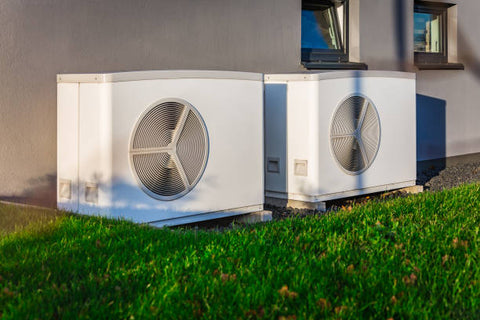Choosing the right heating system for your home involves weighing the benefits and drawbacks of established and emerging technologies. The dilemma must be clarified between an oil boiler, a tried-and-true method with a long history, and the increasingly popular air source heat pump, representing modern efficiency and sustainability. This article explores the distinctions between these two heating systems, examining their functionality, efficiency, costs, maintenance requirements, insulation considerations, and environmental impact. By delving into these aspects, we aim to provide a comprehensive guide to help you decide on the most suitable heating solution for your home.

Air Source Heat Pump vs Oil Boiler: A Comparative Analysis
Understanding Air Source Heat Pumps:
While oil boilers are widespread in over 1.5 million UK homes, air source heat pumps (ASHPs) offer a renewable alternative. ASHPs extract heat from the outside air to provide central heating and hot water. Recent technological advancements have propelled ASHPs to the forefront due to their efficiency, reduced carbon footprint, and cost savings compared to traditional boilers.
Benefits of Air Source Heat Pumps:
Installing an ASHP comes with numerous advantages, including exceptional efficiency, potential savings of up to £780 annually compared to traditional boilers, low carbon emissions, a longer lifespan, minimal maintenance requirements, silent operation, and compatibility with other renewable energy sources such as solar panels.
Understanding Oil Boilers:
Oil boilers generate heat by burning fuel and warming radiators in homes. However, their running costs and environmental impact are increasing concerns. Fueled by burning fossil fuels, oil boilers contribute significantly to global warming.
Comparing Efficiency:
While new oil boilers are initially 92% to 93% efficient, ageing can reduce their efficiency to around 60%. In contrast, ASHPs, utilizing renewable energy, often generate around three times more heat than the energy consumed, resulting in an average efficiency of around 300%.
Analyzing Costs:
Oil boilers generally have lower upfront installation costs but incur higher maintenance and running costs. ASHPs, with higher upfront installation costs, benefit from lower running costs and potential government grants.
Maintenance and Replacement:
Oil boilers require more frequent servicing, replacements, and fuel deliveries and have a lifespan of 10-15 years. ASHPs have minimal maintenance requirements, a longer lifespan of up to 25 years, and reduced energy consumption, making them a cost-effective long-term investment.
Insulation Considerations:
Oil boilers thrive in well-insulated homes, whereas ASHPs demand well-insulated environments to maximize efficiency. Proper insulation ensures that both systems operate at peak efficiency.
Environmental Impact:
Oil boilers, by burning fossil fuels, contribute heavily to global warming, increasing their carbon footprints. ASHPs, relying on renewable energy, significantly reduce their carbon footprints, contributing to environmental preservation while promoting energy efficiency and cost-effectiveness.
In summary, selecting an air source heat pump over an oil boiler reduces energy bills and lowers carbon footprints, making homes more energy-efficient, cost-effective, and environmentally friendly. It's a win-win choice for a sustainable future.

